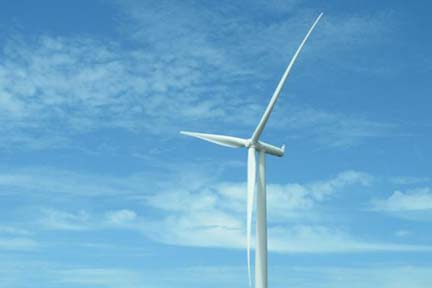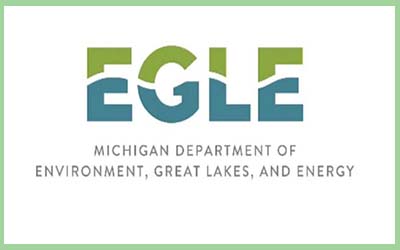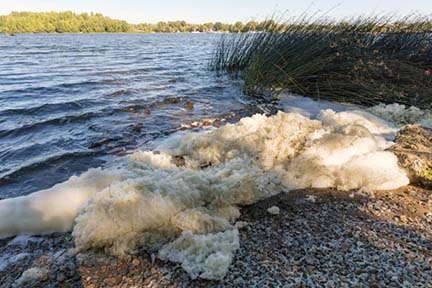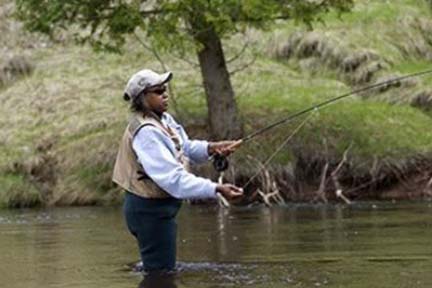May 1, 2025
Contact: Justin Bopp, 517-420-9110 or Joanne Foreman, 517-284-5814
Fishing is a cherished pastime for many Michiganders. Bringing along family, friends and young people helps preserve the tradition, but to keep our waters healthy and thriving for the next generation, be sure you aren’t also bringing invasive species to your favorite fishing spots.
 Invasive species are those that are not native and whose introduction causes harm, or is likely to cause harm, to Michigan’s economy, environment or human health. Most often, invasive species are unintentionally introduced to new places when they become attached to the boats, waders and gear anglers bring on fishing trips. Invasive species are those that are not native and whose introduction causes harm, or is likely to cause harm, to Michigan’s economy, environment or human health. Most often, invasive species are unintentionally introduced to new places when they become attached to the boats, waders and gear anglers bring on fishing trips.
Michigan’s waters are seeing increased effects from invasive aquatic plants like starry stonewort and European frog-bit, which can choke out habitat and limit fishing access. When these plants get caught on motors, trailers, nets and lines, they can be carried to the next fishing spot. Many aquatic invasive plants can sprout from plant fragments, seeds or tiny buds called turions that can go unnoticed without careful inspection. |
Invasive mussels, snails and fish are altering natural food webs in lakes, rivers and streams.
“Zebra mussel larvae, New Zealand mudsnails and didymo cells are hard to see, but they can attach to things like boats, waders and gear,” said Justin Bopp, aquatic invasive species coordinator with the Michigan Department of Natural Resources. “If surfaces are damp, they can survive for several days or even a week. In the same way, water left in bilges, ballast tanks and live wells can carry these tiny organisms and even fish diseases to new locations.”
By planning ahead, following regulations and taking preventive measures before leaving each fishing spot, you can make sure these unwanted hitchhikers don’t travel with you.
Catch and release
When practicing catch-and-release fishing, Michigan law requires anglers to release fish into the waters where they were caught or into connecting waters the fish could have reached on their own.
“Keeping fish in their home waters prevents the spread of fish diseases like heterosporis, a parasite of yellow perch, and viral hemorrhagic septicemia virus, or VHSv, which is highly contagious and can kill trout, perch and other fish species,” said Bopp.
Bait and baitfish
Bait and baitfish should never be released or dumped into the water. Follow state laws when fishing with live bait by disposing of any leftovers on land or in the trash. When catching fish for bait, use them only in the waters where they were originally collected or in a connecting body of water the fish could have reached on their own.
Trout fishing
Didymo (rock snot) and invasive New Zealand mudsnails thrive in cool, clean streams and rivers – extra measures are needed to prevent the spread of these harmful species.
 In addition to removing debris and mud, the State of Michigan recommends using a chemical disinfectant on waders and gear before heading to a new location. Disinfectants with documented effectiveness for these species include: In addition to removing debris and mud, the State of Michigan recommends using a chemical disinfectant on waders and gear before heading to a new location. Disinfectants with documented effectiveness for these species include:
- Products such as Formula 409 Antibacterial All-Purpose Cleaner applied to waders and gear.
- Bleach: Apply a solution of one-half cup (4 fluid ounces) bleach to 5 gallons of water and rinse with clean water after 20 minutes.
- Virkon Aquatic: Apply a solution of 20 grams per liter of water and rinse with clean water after 20 minutes (see manufacturer’s label for additional guidance).
Any chemical disinfectants should be applied to waders and gear on land, at a reasonable distance from the water, to avoid accidental discharge into surface waters.
For more information on effective decontamination practices for trout fishing, watch this new video from Oakland University and Trout Unlimited. |
Bringing a boat
When a watercraft is part of your fishing routine, remember to “Clean, Drain and Dry” boats, trailers and all equipment and gear after each use on any lake, river or stream. State law requires:
- Making sure watercraft and trailers are free of all aquatic organisms and plants before transporting or launching.
- Removing drain plugs and draining all water from bilges, ballast tanks and live wells before transporting watercraft over land.
Drying boats, trailers and gear is an important step to ensure live organisms, like hard-to-see zebra mussel larvae, plant fragments and didymo cells, don’t travel to the next fishing spot. Between sites, do one of the following:
- When possible, dry boats, trailers and gear in the sun for five to seven days.
- Wash boats and trailers with a pressure washer.
- Apply a chemical disinfectant like those listed above.
- Dry surfaces with a towel.
Preventing the introduction and spread of invasive species is the responsibility of everyone who uses Michigan’s valuable fresh-water resources. For more information on invasive species and prevention methods, visit Michigan.gov/Invasives.

Michigan’s Invasive Species Program is cooperatively implemented by the Michigan departments of Agriculture and Rural Development; Environment, Great Lakes, and Energy; and Natural Resources.
Note to editors: Accompanying photos are available below for download. Caption information follows.
- Manistee: As the 2025 fishing season gets underway, remember to do your part to prevent the spread of invasive species.
- Wader wash: Cleaning waders and gear with a chemical solution before moving to the next location can prevent didymo and New Zealand mudsnails from traveling with you.
- Zebra zapper: Check for and remove debris and plant fragments from boats and trailers and empty all water before transporting a boat on the road.
|







